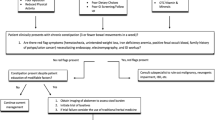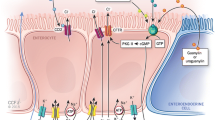Abstract
Constipation is a common adverse effect of antipsychotic therapy that remains understudied and underreported. Weekly constipation screening, continuous long-term monitoring, reducing the antipsychotic dose and switching to a different antipsychotic with less risk of constipation are useful preventive measures. Recommended options for the treatment of antipsychotic-induced constipation include lifestyle changes, behavioural therapy, laxatives and novel drugs (e.g. lubiprostone, prucalopride). Patients who are refractory to pharmacological treatment may be candidates for surgery.
Similar content being viewed by others
References
Xu Y, Amdanee N, Zhang X. Antipsychotic-induced constipation: a review of the pathogenesis, clinical diagnosis, and treatment. CNS Drugs. 2021;35(12):1265–74.
Demler TL, Krieger K. Challenges associated with treating and preventing antipsychotic-induced constipation: considerations and cautions when prescribing novel interventions. Int Clin Psychopharmacol. 2021;36(1):12–7.
Sarangi A, Armin S, Vargas A, et al. Management of constipation in patients with schizophrenia—a case study and review of literature. Middle East Curr Psychiatry. 2021;28(1):1–7.
Lu Y-S, Chen Y-C, Kuo S-H, et al. Prevalence of antipsychotic drugs related to constipation in patients with schizophrenia. Taiwanese J Psychiatry. 2016;30(4):294–9.
Shirazi A, Stubbs B, Gomez L, et al. Prevalence and predictors of clozapine-associated constipation: a systematic review and meta-analysis. Int J Mol Sci. 2016;17:863.
Chougule A, Praharaj SK, Bhat SM, et al. Prevalence and factors associated with clozapine-related constipation: an observational study. J Clin Psychopharmacol. 2018;38(1):42–6.
Every-Palmer S, Ellis PM. Clozapine-induced gastrointestinal hypomotility: a 22-year bi-national pharmacovigilance study of serious or fatal “slow gut” reactions, and comparison with international drug safety advice. CNS Drugs. 2017;31:699–709.
American Gastroenterological A, Bharucha AE, Dorn SD, et al. American Gastroenterological Association medical position statement on constipation. Gastroenterology. 2013;144(1):211–7.
Bailey L, Varma S, Ahmad N, et al. Factors predicting use of laxatives in outpatients stabilized on clozapine. Ther Adv Psychopharmacol. 2015;5(5):256–62.
Every-Palmer S, Lentle RG, Reynolds G, et al. Spatiotemporal mapping techniques show clozapine impairs neurogenic and myogenic patterns of activity in the colon of the rabbit in a dose-dependent manner. Front Pharmacol. 2017. https://doi.org/10.3389/fphar.2017.00209.
Jani B, Marsicano E. Constipation: evaluation and management. Mo Med. 2018;115(3):236–40.
Camilleri M, Ford AC, Mawe GM, et al. Chronic constipation. Nat Rev Dis Primers. 2017. https://doi.org/10.1038/nrdp.2017.95.
Hayat U, Dugum M, Garg S. Chronic constipation: update on management. Cleve Clin J Med. 2017;84(5):397–408.
Palmer SE, McLean RM, Ellis PM, et al. Life-threatening clozapine-induced gastrointestinal hypomotility: an analysis of 102 cases. J Clin Psychiatry. 2008;69:759–86.
Poetter CE, Stewart JT. Treatment of clozapine-induced constipation with bethanechol. J Clin Psychopharmacol. 2013;33(5):713–4.
Every-Palmer S, Newton-Howes G, Clarke MJ. Pharmacological treatment for antipsychotic-related constipation. Schizophr Bull. 2017;43(3):490–2.
Meyer JM, Cummings MA. Lubiprostone for treatment-resistant constipation associated with clozapine use. Acta Psychiatr Scand. 2014;130:71–2.
Torrico TJ, Kaur S, Dayal M, et al. Lubiprostone for the treatment of clozapine-induced constipation: a case series. Cureus. 2022;14(6):e25576.
Nakamura M, Nagamine T. Prevalence and predictors of laxatives use in clozapine-related constipation: an observational study. Int Clin Psychopharmacol. 2021;36:162–7.
Thomas N, Jain N, Connally F, et al. Prucalopride in clozapine-induced constipation. Aust NZ J Psychiatry. 2018;52(8):804–9.
Damodaran I, Hui KO, Nordin ASA, et al. An open-label, head to head comparison study between prucalopride and lactulose for clozapine induced constipation in patients with treatment resistant schizophrenia. Healthcare. 2020;8:533.
George J, Hotham R, Melton W, et al. Clozapine-induced stercoral colitis: a surgical perspective. BMJ Case Rep. 2019;12: e227718.
Rege S, Lafferty T. Life-threatening constipation associated with clozapine. Aust Psychiatry Bull R Aust NZ Coll Psychiatr. 2008;16(3):216–9.
Author information
Authors and Affiliations
Corresponding author
Ethics declarations
Funding
The preparation of this review was not supported by any external funding.
Authorship and conflict of interest
H. A. Blair is a salaried employee of Adis International Ltd/Springer Nature and declares no relevant conflicts of interest. All authors contributed to the review and are responsible for the article content.
Ethics approval, Consent to participate, Consent for publication, Availability of data and material, Code availability
Not applicable.
Rights and permissions
Springer Nature or its licensor holds exclusive rights to this article under a publishing agreement with the author(s) or other rightsholder(s); author self-archiving of the accepted manuscript version of this article is solely governed by the terms of such publishing agreement and applicable law.
About this article
Cite this article
Blair, H.A. Management of antipsychotic-induced constipation requires more attention. Drugs Ther Perspect 38, 356–361 (2022). https://doi.org/10.1007/s40267-022-00935-5
Accepted:
Published:
Issue Date:
DOI: https://doi.org/10.1007/s40267-022-00935-5




